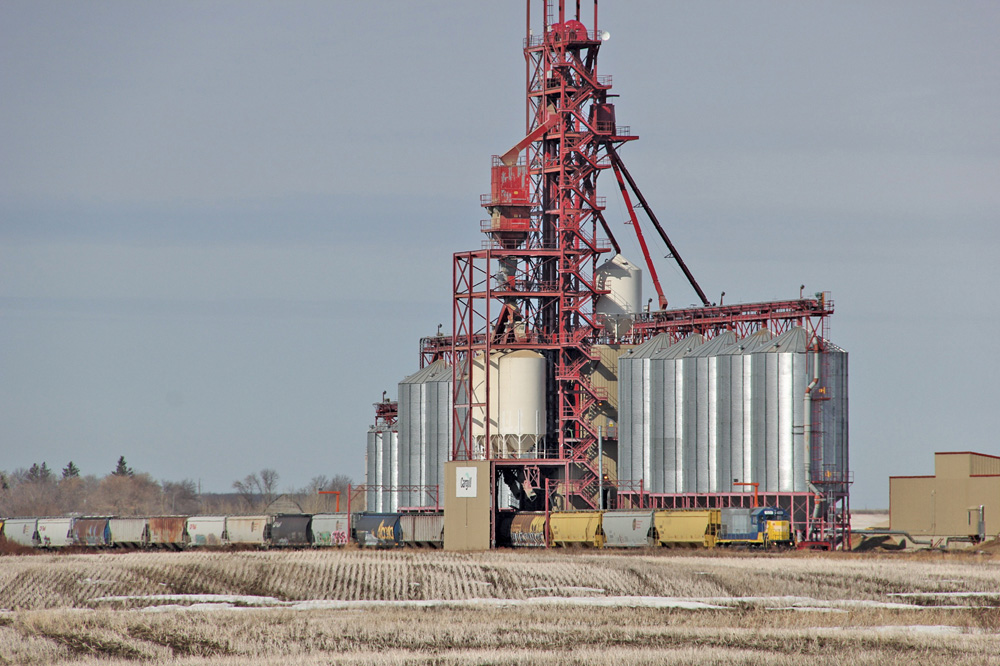Without a competitive rail market, or regulations to mimic one, scrapping the Maximum Revenue Entitlement (MRE) will encourage railways to ship less grain and charge more to do it, warns University of Saskatchewan agricultural economist Richard Gray.

Gray was commenting on the Canada Transportation Act review panel report released two weeks ago. It recommends phasing out the MRE over seven years to create a commercial rail market. However, Gray said the report fails to spell out how one leads to the other.
“I’m not very impressed,” he said in an interview March 4.
The report notes the railways were regulated because grain shippers are captive.
“That reality for grain hasn’t changed… and by no means is it a competitive environment,” Gray said. “There’s no rationale… for saying that we should allow a spatial monopoly (railways) to continue to price as they like.”
Open running rights
The only alternative to the MRE is open running rights, which would drive railway competition by allowing companies to run trains on tracks owned by their competitors, Gray said.
Read Also

Global humanitarian aid slashed by one-third
Humanitarian aid around the world was cut by a third in 2025 and Canada is one of the culprits.
“That’s the only model of competition that is comparable to the regulations of the telecoms or the power grids,” he said. “Anything short of that we’re back to 1896 (before statutory freight rates for Prairie grain were introduced). The CPR was granted a lot of money and resources (from the government) in order to get compensatory rates… of three cents a tonne-mile in perpetuity. If they (rail) want to go back to 1896 they should pay back the resources (land and minerals) they received.”
Although farm groups have welcomed some of the report’s recommendations such as assisting producer car shippers and short line railways, most agree with Gray’s criticisms.
Last week the National Farmers Union as well as a coalition of Saskatchewan farm groups criticized the report.
- Read more: More farm groups pan CTA review panel report
Garbage
By press time the Western Grain Elevator Association (WGEA), which represents the major grain companies, hadn’t commented. However, according to reliable sources grain companies are disappointed and one company boss said so publicly.
“They should throw the report in the garbage,” Paterson Global Foods chief executive officer Andrew Paterson told Reuters. “It is very railroad friendly.”

Meanwhile, former agriculture minister Gerry Ritz, whose government ordered an early review of the act following a massive grain-shipping backlog in 2013-14, says grain farmers need the MRE and other regulations to mimic competition or a truly competitive rail system.
“If there’s nothing there that works then you stay with it (MRE),” he said in an interview. “So they’re not throwing it (MRE) out, out of hand. They’re saying maybe there is a better way to drive this to a commercial system.
“It’s not the report, but what the Liberals do with it that’s going to count.”
The MRE, sometimes referred to as the railway revenue cap, was introduced in 2000, after more than a century of government-regulated rail freight rates ended. The railways rejected running rights and the MRE was the alternative.
Flexibility
The MRE gives the railways rate-setting flexibility, but sets a maximum amount they can earn hauling grain, while guaranteeing them a fair return. The railways claimed the MRE would be moot because they’d be well under it due to competition. In fact, they are at or near the maximum almost every year, which groups point to as evidence of a lack of competition.
Early in his tenure, Ritz said if grain companies paid the railways more they might get better service. But after witnessing the railways move less grain in corridors where they could charge what they wanted, Ritz defended the MRE.
“The argument from the railways that somehow the cap is what’s holding them back is specious at best, ridiculous at worst,” he said.
What’s essential to a commercial system is getting level-of-service agreements between grain companies and the railways that define adequate and suitable service and include railway penalties when they fail to meet their commitments, Ritz said.
“A commercial system without reciprocal penalties doesn’t work,” he said. “MRE or no MRE, it doesn’t work.”
That’ll be music to the WGEA’s ears. The WGEA has also staunchly defended the MRE in the absence of rail competition. Gray says that makes sense. Without the MRE the railways will have an incentive to reduce service relative to demand.
Supply and demand
When demand exceeds supply, prices go up, Gray said.
“The grain companies realize the railways have a pretty clear incentive to move as much grain as they can under the Maximum Revenue Entitlement and that isn’t the case if they (railways) get to capture the basis from reduced service,” he said.
“It’s really grain producers who have the interest in a low-cost rail system.
“The idea that unregulated prices are competitive when you have two firms — I don’t think anybody would believe that.”
The notion that Western Canada’s grain transportation system is underperforming is inherent in the report, Gray said.
“There’s a huge amount of evidence (including from Grain Monitor Quorum Corp.) that suggests the system has become way more productive under the revenue cap,” he said. “The Australians took a look at it and they’re just drooling as to how efficient our rail system is. So to suggest somehow that we have a system that is broken and not working is, I don’t think, in touch with reality.”
Interswitching
The report recommends eliminating interswitching — something Ritz and Gray — agree stimulates competition.
“I think it’s very important to have that availability,” Ritz said.
“If you believe in competition why get rid of that?” Gray said. “All the public utilities would say there should be open running rights on both railways. Interswitching is a very limited access to each other’s networks, but it should be still there.”
Interswitching should be included in the MRE, otherwise the railways will use interswitching to get around the MRE,” he added.
Gray, who met with the CTA review panel and also submitted suggestions in writing, said he proposed adjusting the MRE to allow the railways to earn more when shipping during busy periods. The panel instead recommended allowing the railways to offer service outside the MRE — a plan Gray said will hurt farmers.
“If you take a chunk of the business outside the MRE, any time service becomes scarce the prices of those non-MRE services will go through the roof because it’s a way to get access,” he said. “And if those rates go up, all basis levels will go up. If all basis levels go up it’s going to cost farmers a lot of money.”
The report recommends removing containers moving grain from the Prairies to the West Coast from the MRE. Gray supports that because competition from companies stuffing containers at the West Coast will keep the railways from overcharging.


















